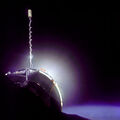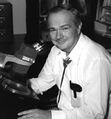Template:Selected anniversaries/July 18: Difference between revisions
No edit summary |
No edit summary |
||
| (33 intermediate revisions by the same user not shown) | |||
| Line 1: | Line 1: | ||
<gallery> | <gallery> | ||
File: | |||
File:Hermann_der_Lahme.gif|link=Hermann of Reichenau (nonfiction)|1039: Composer, mathematician, and astronomer [[Hermann of Reichenau (nonfiction)|Hermann of Reichenau]] born. He will write a treatise on the science of music, several works on geometry and arithmetic, and astronomical treatises (including instructions for the construction of an astrolabe, then a very novel device in Western Europe). | |||
||1742: Abraham Sharp dies ... mathematician and astronomer. Pic. | |||
||1768: Amateur mathematician Jean-Robert Argand born. In 1806, while managing a bookstore in Paris, he published the idea of geometrical interpretation of complex numbers known as the Argand diagram and is known for the first rigorous proof of the Fundamental Theorem of Algebra. Pic search: https://en.wikipedia.org/wiki/Jean-Robert_Argand | |||
||1807: Thomas Jones dies ... Head Tutor at Trinity College, Cambridge for twenty years and an outstanding teacher of mathematics. Pic. | |||
||1832: Claude-François-Dorothée, marquis de Jouffroy d'Abbans dies ... inventor of early (perhaps earliest) steamboat. Pic: https://fr.wikipedia.org/wiki/Fichier:Claude_Fran%C3%A7ois_Doroth%C3%A9e_marquis_de_Jouffroy_d%27Abbans.png | |||
Hendrik_Antoon_Lorentz.jpg|link=Hendrik Lorentz (nonfiction)|1853: Physicist and academic [[Hendrik Lorentz (nonfiction)|Hendrik Lorentz]] born. He will share the 1902 Nobel Prize in Physics with Pieter Zeeman for the discovery and theoretical explanation of the Zeeman effect. | |||
||1869: Lt-Col Edward Frank Harrison C.M.G. born ... English chemical scientist, credited with the invention of the first serviceable gas mask during World War I. DOB/DOD: https://simonjoneshistorian.com/2016/07/07/edward-harrison-who-gave-his-life-developing-protection-against-poison-gas/ Pic. | |||
File:Karl Weierstrass.jpg|link=Karl Weierstrass (nonfiction)|1872: In a lecture to the Berlin Academy, mathematician [[Karl Weierstrass (nonfiction)|Karl Weierstrass]] gives the classic example of a continuous nowhere differential function. | |||
||1890: Christian Heinrich Friedrich Peters dies ... astronomer, and a pioneer in the study of asteroids. Pic. | |||
||1891: Emil Julius Gumbel dies ... mathematician and statistician. Gumbel was instrumental in the development of extreme value theory, along with Leonard Tippett and Ronald Fisher. He also derived and analyzed the probability distribution that is now known as the Gumbel distribution in his honor. Pic search yes: https://www.google.com/search?q=emil+julius+gumbel | |||
||1900: Johan Gustav Christoffer Thorsager Kjeldahl dies ... chemist who developed a method for determining the amount of nitrogen in certain organic compounds using a laboratory technique which was named the Kjeldahl method after him. Pic. | |||
||1900: U.S. Army combat historian Samuel Lyman Atwood Marshall born. Known professionally as S. L. A. Marshall, and nicknamed "Slam" (the combination of all four of his initials), he authored some 30 books about warfare, including ''Pork Chop Hill: The American Fighting Man in Action'', which was made into a film of the same name. However, his legacy is mired in scandal, as he lied about his involvement in the primary events he wrote about. Pic. | |||
||1906: Edwin Ford Beckenbach born ... mathematician. Pic. | |||
||1906: Sidney Darlington born ... electrical engineer and inventor of a transistor configuration in 1953, the Darlington pair. He advanced the state of network theory, developing the insertion-loss synthesis approach, and invented chirp radar, bombsights, and gun and rocket guidance. Pic. | |||
||1908: Beatrice Aitchison born ... mathematician, statistician, and transportation economist. | |||
||1914: The U.S. Congress forms the Aviation Section, U.S. Signal Corps, giving official status to aircraft within the U.S. Army for the first time. | |||
||1922: Thomas Kuhn born ... physicist, historian, and philosopher. Kuhn's 1962 book ''The Structure of Scientific Revolutions'' was influential in both academic and popular circles, introducing the term paradigm shift, which has since become an English-language idiom. Pic. | |||
||1926: Thomas L. Saaty born ... inventor, architect, and primary theoretician of the Analytic Hierarchy Process (AHP), a decision-making framework used for large-scale, multiparty, multi-criteria decision analysis, and of the Analytic Network Process (ANP), its generalization to decisions with dependence and feedback. Pic. | |||
||1927: Harden M. McConnell born ... chemist and academic ... contributed to the understanding of the relation between molecular electronic structure and electron and nuclear magnetic resonance spectra during the period of 1955 through 1965. After that, he developed the technique of spin-labels, whereby electron and nuclear magnetic resonance spectra can be used to study the structure and kinetics of proteins and membranes. Pic search: https://www.google.com/search?q=harden+m.+mcconnell | |||
||1931: Oskar Minkowski dies ... biologist and academic ... research on diabetes. Pic. | |||
||1937: Hunter S. Thompson born ... journalist and author. Pic. | |||
||1939: Arthur Edwin Kennelly dies ... electrical engineer. Pic. | |||
||1942: The Germans test fly the Messerschmitt Me 262 using its jet engines for the first time. | ||1942: The Germans test fly the Messerschmitt Me 262 using its jet engines for the first time. | ||
||1962: Eugene Houdry dies ... mechanical engineer and inventor. Houdry invented catalytic cracking of petroleum feed stocks. Pic. | |||
||1963: Operation Blowdown was an explosives test carried out in the Iron Range jungle of Australia's Cape York Peninsula in 1963, to simulate the effects of a nuclear weapon on tropical rainforest. It was conducted by the Australian Army, the Department of Supply, and the Defence Standards Laboratory with participation from the United Kingdom, Canada and United States. In addition, blast effects on military material, field fortifications, supply points, and foot and vehicle movement were examined in a rain forest environment. | |||
File:Gemini-10 Agena firing.jpg|link=Gemini 10 (nonfiction)|1966: Human spaceflight: [[Gemini 10 (nonfiction)|Gemini 10]] is launched from Cape Kennedy on a 70-hour mission that includes docking with an orbiting Agena target vehicle. | |||
File:Henrietta Bolt.jpg|link=Henrietta Bolt|1967: Engineer, pilot, and alleged time-traveller [[Henrietta Bolt]] tells fellow astronauts that [[Gemini 10 (nonfiction)|Gemini 10]] "was an inspiration to us all." | |||
||1968: Corneille Heymans dies ... physiologist and academic, Nobel Prize laureate ... blood brain. Pic. | |||
||1987: Gilberto Freyre dies ... sociologist, anthropologist, historian, writer, painter, journalist and congressman. | |||
File:Eugene Shoemaker.jpg|link=Eugene Merle Shoemaker (nonfiction)|1997: Geologist and astronomer [[Eugene Merle Shoemaker (nonfiction)|Eugene Merle Shoemaker]] dies. Shoemaker was the first scientist to conclude that Barringer Meteor Crater in Arizona, and similar craters, were caused by meteor impact. | File:Eugene Shoemaker.jpg|link=Eugene Merle Shoemaker (nonfiction)|1997: Geologist and astronomer [[Eugene Merle Shoemaker (nonfiction)|Eugene Merle Shoemaker]] dies. Shoemaker was the first scientist to conclude that Barringer Meteor Crater in Arizona, and similar craters, were caused by meteor impact. | ||
||2009: Ernest Henry Nickel dies ... mineralogist ... best known as an editor of the ninth edition of the Nickel-Strunz classification together with Karl Hugo Strunz. Pic search yes: https://www.google.com/search?q=Ernest+Henry+Nickel | |||
||2012: Frances Spence dies ... one of the original programmers for the ENIAC. Pic. | |||
||2018: Burton Richter dies ... physicist. He led the Stanford Linear Accelerator Center (SLAC) team which co-discovered the J/ψ meson in 1974, alongside the Brookhaven National Laboratory (BNL) team led by Samuel Ting for which they won Nobel Prize for Physics in 1976. This discovery was part of the so-called November Revolution of particle physics. Pic. | |||
</gallery> | </gallery> | ||
Latest revision as of 10:13, 7 February 2022
1039: Composer, mathematician, and astronomer Hermann of Reichenau born. He will write a treatise on the science of music, several works on geometry and arithmetic, and astronomical treatises (including instructions for the construction of an astrolabe, then a very novel device in Western Europe).
1853: Physicist and academic Hendrik Lorentz born. He will share the 1902 Nobel Prize in Physics with Pieter Zeeman for the discovery and theoretical explanation of the Zeeman effect.
1872: In a lecture to the Berlin Academy, mathematician Karl Weierstrass gives the classic example of a continuous nowhere differential function.
1966: Human spaceflight: Gemini 10 is launched from Cape Kennedy on a 70-hour mission that includes docking with an orbiting Agena target vehicle.
1967: Engineer, pilot, and alleged time-traveller Henrietta Bolt tells fellow astronauts that Gemini 10 "was an inspiration to us all."
1997: Geologist and astronomer Eugene Merle Shoemaker dies. Shoemaker was the first scientist to conclude that Barringer Meteor Crater in Arizona, and similar craters, were caused by meteor impact.





